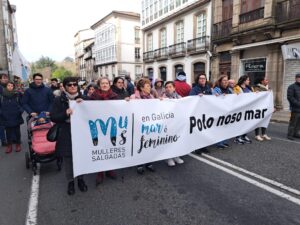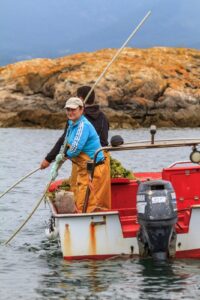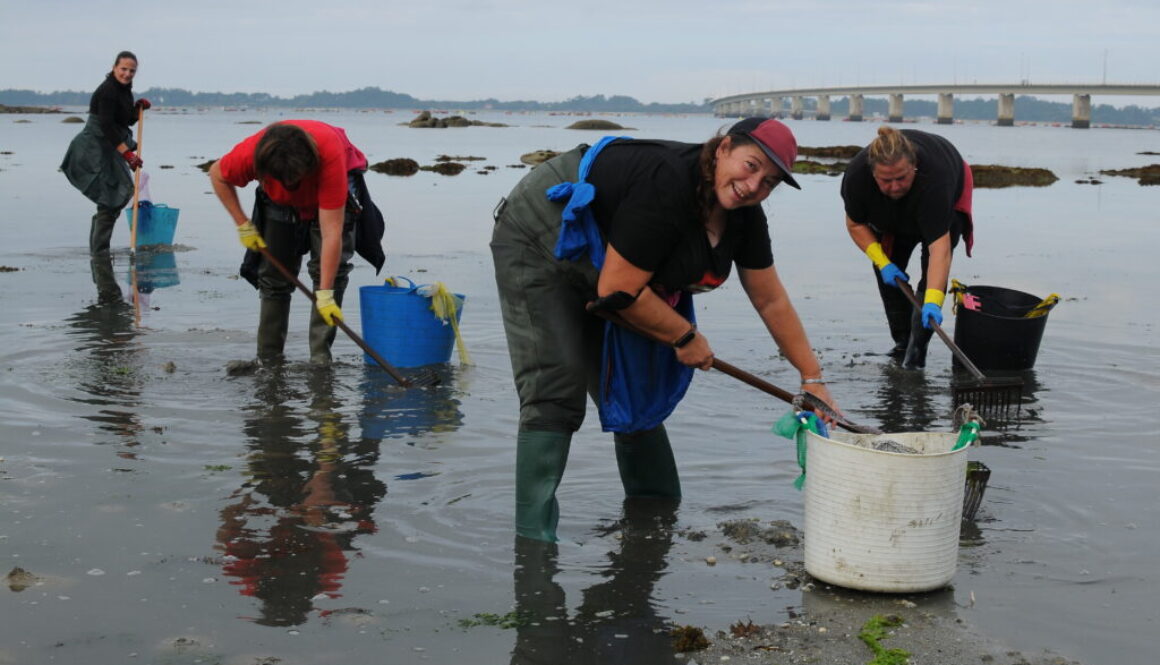Meet LIFE new Members: Mulleres Salgadas
In April 2024, Mulleres Salgadas officially joined the Low Impact Fishers of Europe. In the interview below, Sandra Amezaga, their Executive Secretary, tells us more about their incredible work, daily fights and hopes for the future.
 Welcome to LIFE! We are very happy to have you as members of our platform. Could you tell us a bit more about your organisation, its origin, where you are, and where you work?
Welcome to LIFE! We are very happy to have you as members of our platform. Could you tell us a bit more about your organisation, its origin, where you are, and where you work?
Mulleres Salgadas was founded at the end of 2016 as Asociación de Mulleres do mar de Arousa, with scope in the Arousa estuary and the provinces of A Coruña and Pontevedra. Subsequently, we decided to become an autonomous association and changed the name to Mulleres Salgadas-Asociación Galega de Mulleres do Mar, extending our action to the whole territory of Galicia.
How many shellfish gatherers does your organisation represent, how is your work carried out, and what fishing gear do you use?
There are currently 1695 members, 1296 of whom are shellfish gatherers on foot, which reflects the gender distribution of the different sea trades in Galicia. In addition, there are shellfish gatherers afloat, barnacle gatherers, etc.
Shell fishing on foot is an artisanal activity in which there have been few changes in gears and methods, although there have been changes in management. In addition to collecting bivalves, shellfish gatherers also sow, care for, regenerate, and clean the beaches.
Has the work of women shellfish gatherers always been carried out by women?
In contrast to shellfishing afloat, shellfishing on foot has been a largely female occupation, although a few men have entered the profession in recent years.
In a recent interview, you told us that the shellfish industry is going through a very complicated time in Galicia. Could you tell us what are the most important concerns of the sector right now?
 Right now, the main concern is the mortality of shellfish on the beaches and the decline in shellfish resources. We are at a time when many of Galicia’s shellfish gatherers’ groups are ceasing activity or collecting very small quotas, which means a lack of income. Not all shellfish gatherers are entitled to receive the cessation benefit; furthermore, the procedures take a long time. There are still shellfish gatherers who have not received anything and have not worked since January. It is urgent to rethink the management of shellfishing as well as the requirements for obtaining the permits and the conditions to benefit from the cessation of activity.
Right now, the main concern is the mortality of shellfish on the beaches and the decline in shellfish resources. We are at a time when many of Galicia’s shellfish gatherers’ groups are ceasing activity or collecting very small quotas, which means a lack of income. Not all shellfish gatherers are entitled to receive the cessation benefit; furthermore, the procedures take a long time. There are still shellfish gatherers who have not received anything and have not worked since January. It is urgent to rethink the management of shellfishing as well as the requirements for obtaining the permits and the conditions to benefit from the cessation of activity.
Climate change is already directly affecting Galician fisheries. Other factors, such as pollution, poaching, etc., must also be addressed. It is very urgent to adapt to global warming, which is already here and has substantial consequences.
You also commented that shellfish gatherers do not have the same decision-making power in the cofradias as other members, such as small-scale fishers. Could you explain why this is the case and what could be done to change this?
Many conditioning factors lead to the lower presence of women in the management and leadership bodies of the cofradias, most of which are common to other professional groups and fields. Women have traditionally been relegated to the private sphere, to the home; they are responsible carers of the home and the family. There is an overload of domestic work, which, added to their professional tasks, leaves them exhausted and without time to devote to representation or to try to gain access to power. There is a perceived lack of motivation. This long-standing situation requires collective intervention and mentality change, including women and men. Furthermore, the Galician Law on Guilds does not help women to participate more. This law, dating from 1993, guarantees parity between workers and employers in the governing bodies of the guilds and considers that shell fishing on foot is included in the census of workers.
For us, the law on the cofradias must be modified entirely, seeking formulas for equal representation. This is one step, but not the only one we must take.
LIFE’s main mission is to bring together and raise the voices of small-scale fishers at the European level. How do you think LIFE could support you in your struggle to sustain the seafood sector in your region?
Despite the differences and peculiarities in the different areas, there are common problems where we can all benefit from each other’s experiences and contribute to finding solutions. LIFE is also an opportunity for the voices of many women who are not present in decision-making forums and who find it difficult to make themselves heard.
Access Mulleres Salgadas website here
∗∗∗
